Studio blog
Posted on Tue 9 Jun 2020
Building Creative business capacity
This is Part One of a series of four blogs Gill Wildman is writing for the Studio. Gill Wildman is Business Development Adviser for Watershed and SWCTN.
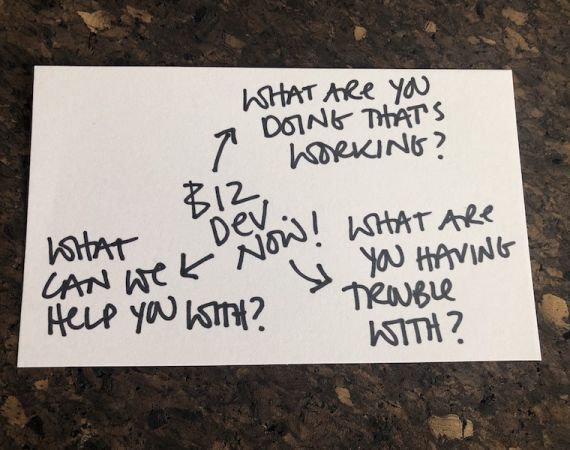
c/o Gill Wildman
Business development for Creative business is not your usual business development
Last year at the Watershed we published the final report on the Network for Creative Enterprise project (written with our close colleagues at Creative Economy Unit, UWE Bristol). It feels that now is a good moment to talk about our understanding of how creative collaborations become resilient social or for profit businesses and thrive over time. It’s time to reflect on the range and depth of creative and social business development at the Watershed where we aim to value a range of approaches to doing business, recognising values as well as value and the importance of sustainability as much as growth.
Creative collaborations
Since 2008, Watershed via the Pervasive Media Studio has been catalysing and nurturing some truly innovative creative collaborations, founded on the belief that different perspectives lead to better outcomes. Starting with Media Sandbox back in 2008/10, followed by Heritage Sandbox, Future Documentary Sandbox, Books & Print Sandbox, Objects Sandbox and Play Sandbox — we have explored future facing themes and created new collaborations that have formed core participants in our creative economy. It was never just about attracting brilliant talent, but was also about the need to give them a good fertile space to work and connect with each other. Our work is always about connecting people to each other, believing that a thriving community creates a network of support far richer than a series of injections of advice or resources.
Collaborations into early stage companies
The REACT programme funded many of these Sandboxes. It ran between 2012 and 2016, and supported 57 creative companies alongside academic collaborators from the arts and humanities to work together on collaborative R&D. In total, 86 new products were produced, 76 new pieces of software, and 10 brand new companies. In the longer term, REACT stimulated over £5.35 million in further investment from private investment, sales and commissions.
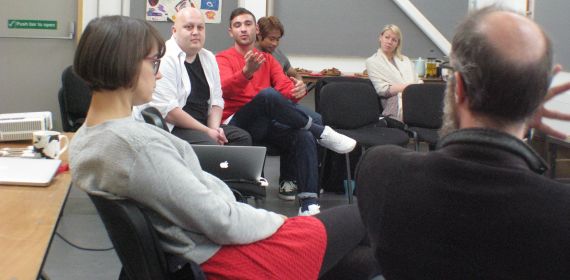
REACT Alumni Programme, Big Expert Day, London
What was even more pioneering was that the REACT project extended into a programme to support 10 early stage companies coming out of that process to get their business onto firmer footing: half of them were given early business development, and the other half worked directly with investors Station 12. While the road was challenging and not everything ran smoothly, these companies produced a range of success with some translating exciting prototypes into new products to support ongoing business (see Mayfly’s beautiful sound journal).
Early stage companies into resilient businesses
Artful Innovation, developed in collaboration with Stephen Gatfield, built on this idea as an intensive programme specifically aimed at making a selection of creative businesses investment ready. It uniquely connected the creative business development work in the Watershed to the world of investors and the chance to grow exponentially.
We were (and are always) part of an ecology of support in Bristol and further afield but many of the companies involved have evolved and grown: Trove and Music Memory Box became Studio Meineck. Mecha Monsters the world’s first gaming robots became Reach Robotics. The popular physical digital game produced by React alumni Fabulous Beasts became the company Sensible Object, which more recently became acquired by Niantic.
Widening the net
In October 2017, the Network for Creative Enterprise programme opened up a new approach to business development for many more creative practitioners. Led by Watershed with UWE Bristol, over 2 years, they were given access to workshops, bursaries, mentoring and space, based at four venues in the west of England (Spike Island, The Guild, Knowle West Media Centre, the Factory and the Pervasive Media Studio at the Watershed). All of them had some kind of creative practice, some with existing businesses. They brought their practice from a wide range of creative work: theatre production, immersive experiences, information video production, jewellery making, marketing, copyrighting. They brought their 34 embryonic new products, such as sustainable lunch carrying products Bric, to new products ideas using sustainable materials by Ecotribo. You can download and read the report here. This package of creative business support gave a whole new audience a more structured and productive way of seeing their work as a means of supporting their lives through 27 new businesses.
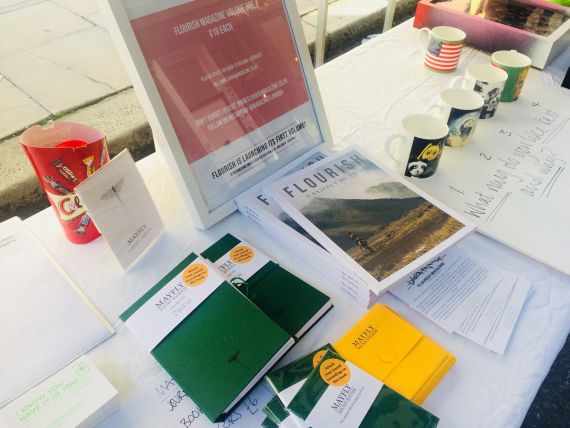
Market Testing products in Cheshire St Market the NfCE Programme
The collective effect of the programmes from the Sandboxes to REACT to NfCE is that we have built up a body of expertise in supporting creatives to establish themselves as value creating viable commercial and social businesses. Over time we have developed a unique approach to creative business development. Through NfCE particularly we learnt that moving away from a linear approach to development (with business development support kicking in at the end of a programme) to ongoing support, we can be much more responsive to need.
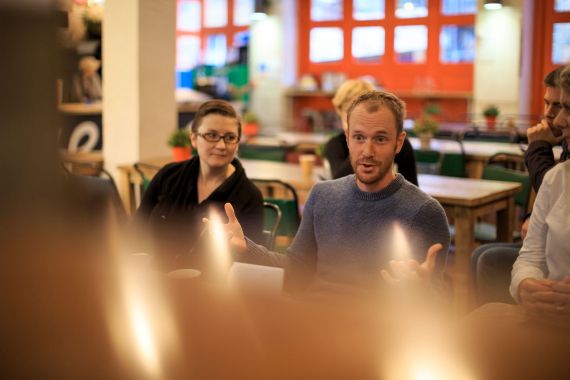
Running a creative business workshop at the REACT Rooms Festival Photo: Max McClure
Business development right now
Now with a dedicated business development advisor, we bring our knowledge of creative enterprise support to the South West Creative Technology Network's calls to explore Immersion and currently Automation and Data through innovative research and new product, service and experience development. At the same time, we are supporting Bristol and Bath R&D project, which is in the process of creating new explorations about Digital Placemaking, and Expanded Performance.
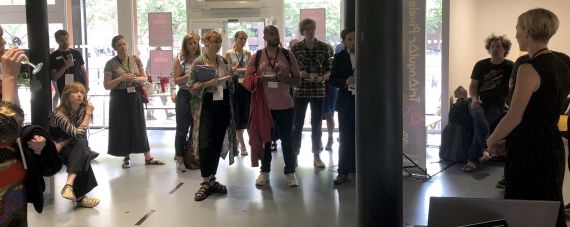
Bringing creative companies and investors together informally over lunch at the SWCTN Immersion Showcase 2019
Our companies are taken through a programme that engages creative thinking in business development we are calling Prototyping the Business. We have been able to articulate a clear methodology of bringing creative thinking into business thinking. We are connecting them to follow-on programmes, and investor schemes. We have produced guides and tools to help creative companies navigate preparing for investors. Now we are also connecting creative companies with sympathetic investors, and building investor awareness into our programme.
In the future
Over the next year and into the future we are going to see something like 30+ new businesses coming out of these programmes, bringing new products, experiences, platforms and services into the world. Our intention is that the creative founders also know how to build their business on the best foundations.
We want to see more of the companies that come though our programmes become bigger bright lights as Sensible Object and Open Bionics , but very much actively support those who want to stay small.
We will support more and more to take first steps in their businesses, and to start to develop these business as long term contributors to the creative economy. We will also explore how we make our kind of creative business development work scale, and what might be the best vehicles for that.
This all builds towards a great opportunity for everyone — for us to clarify and expand on the contribution we can make, for the companies themselves to thrive, and for potential venture and impact investors to participate in the success of these new innovative businesses. What is particularly pleasing for me is that these businesses will be built on this collective experience of making creative business work.
Right now of course, much of our community are in crisis mode - trying to figure out how they can adapt and survive - and we are thinking fast about how we can best support them. I will be sharing my notes on creative business support during COVID 19 here over the coming weeks, starting with ‘Business heroes need not apply’
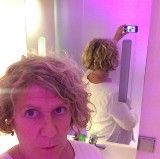
Written by
Gill Wildman
Strategic designer working in technology, social design & innovation for 20 years. Currently at the Watershed as Business Development Advisor, Upstarter & Plot